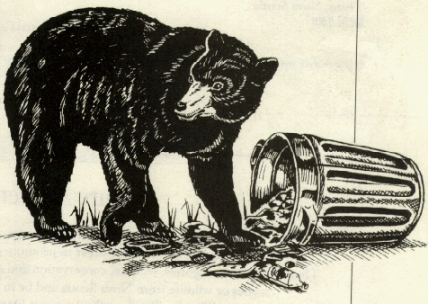
by: Mark Pulsifer
Fall 1993

Many of Nova Scotia's rural and back country areas have experienced human population growth and increased accessibility. Potential conflicts between humans and wildlife have increased significantly because of this change.
In recent years, Department of Lands and Forestry staff have received hundreds of nuisance bear complaints from around the province. while some of these complaints are simply reports of bear sightings, others are the result of bears damaging or causing loss to property. depending on where you live, damage to commercial blueberry fields, beehives, apple trees, corn, or grain fields may be common. As well, potential human injury is great because bears beg for food from doorsteps, or they destroy wood's camps while searching for something to eat.
The cause of these complaints is not a mystery. bears consume large amounts of food; they are opportunistic feeders. they take whatever food they can find, wherever they can find it, and in the easiest manner possible. Therefore, it's not surprising to find a bear foraging in a garbage dumpster while streams are full of gaspereau and trees are ripe with apples. A bear's diet changes with the seasons, depending on the availability of food.
Bears are creatures of habit and association. Once bears discover a camp with garbage around it is a potential source of food, they associate all camps with food, no matter how clean they may be. Similarly, bears that lose their fear of humans because of over familiarity may become potentially dangerous.
Control of nuisance bears often depends on the problem. Electric fences and enclosures have been successful protection for bee hives and some agricultural crops. In situations involving humans, there are few options. Live trapping is seldom feasible because there are virtually no wilderness areas where an offending bear can be released. Tagged offenders have been found near their original capture area within days, despite the long distances.
Unfortunately, many problem bears are destroyed once they lose their fear of humans because they are unpredictable. Their depredating has caused economic losses for individuals. this does not have to be case. It's important that you leave bears alone. If you are fortunate enough to see one, observe it from a safe distance. Also, keep a clean camp and do not intentionally feed a bear. Eventually, a fed bear becomes a dead bear.
For more information on nuisance bears, contact your nearest Department of Lands and Forestry office.